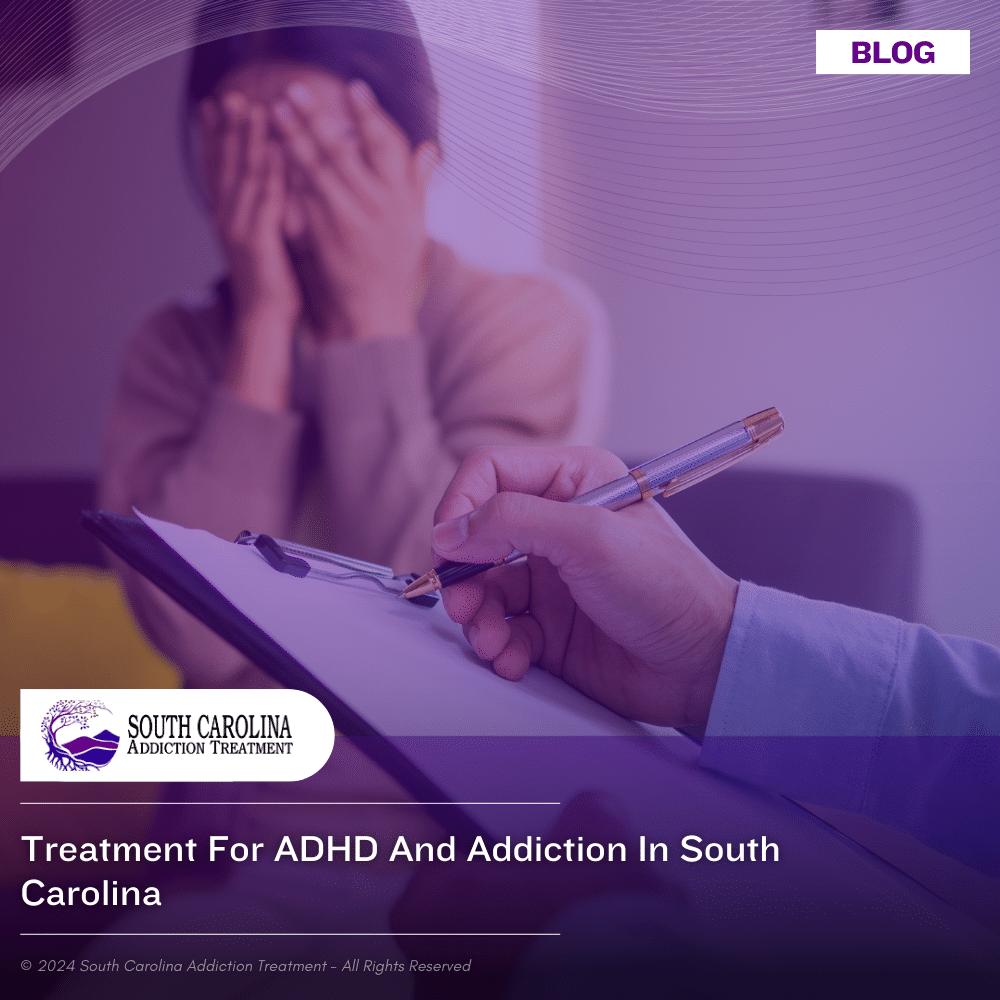Treatment for ADHD and Addiction in South Carolina

Medically Verified: 2/1/24
Medical Reviewer
Chief Editor

All of the information on this page has been reviewed and verified by a certified addiction professional.
Attention deficit hyperactivity disorder (ADHD) is a mental health condition characterized by difficulty with attention, hyperactivity, and impulsiveness. Typically, ADHD begins in childhood and continues to affect the individual throughout their adulthood.
This mental health condition is known to cause low self-esteem, interpersonal relationship issues, and difficulty performing in school or work. Because of the impulsiveness associated with ADHD, addiction is a common co-occurring disorder.
According to The National Institute of Health, individuals diagnosed with ADHD are twice as likely to develop a substance use disorder than the general population.[1]
When ADHD and addiction co-occur, individuals must receive professional dual diagnosis treatment for both conditions simultaneously. This is because the symptoms of each condition trigger one another. For example, if an individual is only treated for their substance abuse issues, their ADHD may trigger them to relapse in the future.
Dual diagnosis treatment centers in South Carolina create individualized treatment plans for patients with ADHD and addiction.
The Relationship Between Attention Deficit Hyperactivity Disorder (ADHD) and Substance Abuse
There are many ways that ADHD and substance abuse can become interlinked, including genetics, environment, and brain chemistry. One of the most compelling ideas regarding the relationship between ADHD and substance abuse revolves around the neurotransmitter dopamine.
Studies have shown that individuals who suffer from ADHD have lower levels of dopamine in their brains.[1] Dopamine is one of the chemicals in our brains that provides us with feelings of happiness and euphoria. In an unconscious effort to make up for the lack of dopamine, people with ADHD sometimes turn to drugs or alcohol to cope.
Additionally, many individuals with ADHD experience frequent mood swings. This constant shifting of moods can cause an individual a great deal of frustration, especially when it begins to affect their everyday life. When mood swings occur, some people may begin to abuse substances to control or numb their emotions.
In other words, the main theories surrounding the relationship between ADHD and addiction tend to lean towards self-medication and symptom control – highlighting the essential need for effective dual diagnosis treatment.
How are Attention Deficit Hyperactivity Disorder (ADHD) and Addiction Treated?
According to The National Institutes of Health, “The simultaneous treatment of both conditions is likely to be the optimal approach because ADHD symptoms (eg, impulsivity, poor planning) will interfere with SUD treatment, and substance use will limit the benefit of ADHD treatment.”[2] But how exactly does a dual diagnosis program in South Carolina treat the two conditions?
Because ADHD and substance use disorder cause an array of behavioral symptoms, a large majority of treatment relies on behavioral therapy. Additionally, individuals are often provided with non-narcotic medications to manage the symptoms of their ADHD.
Treatment for ADHD and addiction may consist of:
Medications
Most individuals who take medication for their ADHD are prescribed a stimulant. This is because stimulants increase the levels of dopamine in an individual’s brain, causing this type of medication to effectively treat the symptoms of ADHD. However, individuals who struggle with both ADHD and substance abuse may not be able to take stimulant medications due to the potential for misuse.
Before resorting to stimulant medications for symptom management of ADHD, dual diagnosis treatment programs prescribe non-narcotic medications. Typically, these medications belong to the alpha-2 agonist and the serotonin-norepinephrine reuptake inhibitor (SNRIs) drug classes.
Examples of non-narcotic medications used to treat ADHD among people in recovery include:
- Atomoxetine (Strattera)
- Guanfacine (Intuniv and Tenex)
- Clonidine (Kapvay)
Cognitive-Behavioral Therapy (CBT)
Cognitive-behavioral therapy (CBT) is a type of behavioral therapy that helps individuals change unhealthy patterns of thought and behavior. This type of therapy has been found extremely effective in the treatment of addiction cravings and triggers.
Additionally, CBT is one of the main therapies used during both ADHD and substance abuse treatment. Cognitive-behavioral therapy helps individuals with ADHD learn how to self-regulate their emotions, learn mindfulness tactics for focus, and change unhealthy patterns of thought.
Group Counseling
Group counseling has always been a significant aspect of addiction treatment. When patients are brought together to discuss similar issues, they can gain support and understanding from one another.
Group counseling also provides recovering addicts with insight into their daily struggles, new coping mechanisms that their peers find beneficial, and a safe space to vent.
Individuals with ADHD receive an array of benefits from attending group counseling. Being able to speak with other individuals who struggle with the same condition and experience similar symptoms can be extremely therapeutic for people with ADHD. Additionally, individuals with ADHD can learn new coping strategies from their peers during group counseling.
Relapse Prevention Planning
Relapse prevention planning is an extremely vital tool for individuals with any form of dual diagnosis. However, this is especially true for individuals with co-occurrence of ADHD and addiction.
Relapse prevention planning is the process of putting together tools, strategies, and plans that help individuals maintain their recovery after they complete treatment. Because poor planning, issues with prioritizing, and impulsiveness are symptoms of ADHD, having a solid relapse prevention plan is of the utmost importance.
Find Treatment for Attention Deficit Hyperactivity Disorder (ADHD) and Addiction in SC Today
Struggling with unmanaged ADHD and addiction is never easy, especially when you feel like you don’t have any help. Thankfully, dual diagnosis treatment centers in South Carolina are here to provide you with the tools and support that you need to recover.
Contact South Carolina Addiction Treatment Center for more information on our dual diagnosis treatment program.
References:

